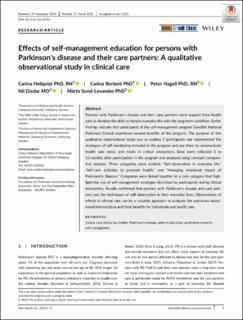Effects of self‐management education for persons with Parkinson's disease and their care partners: A qualitative observational study in clinical care
Journal article

Åpne
Permanent lenke
https://hdl.handle.net/11250/2660953Utgivelsesdato
2020Metadata
Vis full innførselOriginalversjon
Hellqvist, C., Berterö, C., Hagell, P., Dizdar, N., & Sund-Levander, M. (2020). Effects of self-management education for persons with Parkinson's disease and their care partners: A qualitative observational study in clinical care. Nursing & Health Sciences, n/a(n/a). https://doi.org/10.1111/nhs.12721Sammendrag
Persons with Parkinson's disease and their care partners want support from health care to develop the skills to handle everyday life with the long‐term condition. Earlier findings indicate that participants of the self‐management program Swedish National Parkinson School experience several benefits of the program. The purpose of this qualitative observational study was to explore if participants had implemented the strategies of self‐monitoring included in the program and use them to communicate health care status and needs in clinical encounters. Data were collected 3 to 15 months after participation in the program and analyzed using constant comparative analysis. Three categories were evident: “Self‐observation in everyday life,” “Self‐care activities to promote health,” and “Managing emotional impact of Parkinson's Disease.” Categories were linked together in a core category that highlight the use of self‐management strategies described by participants during clinical encounters. Results confirmed that persons with Parkinson's disease and care partners use the techniques of self‐observation in their everyday lives. Observations of effects in clinical care can be a valuable approach to evaluate the outcomes educational interventions and their benefits for individuals and health care.
